- Home
- Will Hobbs
Wild Man Island Page 2
Wild Man Island Read online
Page 2
Hyperalert, I started into the open water. As I rounded the point, there was only the slightest wind and the slightest chop. Still, my breath was coming faster and my adrenaline was up. No reason to get excited—in a few minutes I had cleared the point and was gliding into the calm waters of Kasnyku Bay.
Immediately I could see the creek at the back of the bay. At the foot of a steep mountainside, it plunged out of the forest onto a strip of grassy tidal flats. I strained to spot Hidden Falls in the timber beyond, but all I could see through the trees was a hint of sheer gray cliffs.
As I paddled toward the rear of the bay, I let my mind drift across the years. My father had been hiking down from Hidden Lake with a geologist when it happened. They were making their way down the cliffs by the side of Hidden Falls.
My father had a geologist along because he was looking for a certain kind of limestone terrain called karst. Karst is known for ravines, sinkholes, underground streams, and especially for caves. My father was hoping to find caves on Baranof Island.
Their search had taken them from tidewater on the west side of the island, across its volcano-studded backbone, to tidewater on the east side. We found out later that they didn’t find any caves; they didn’t even find karst. Now that I’d seen for myself how the forests on these islands blanketed the bedrock underneath them, I could understand what they’d been up against.
My father, Alex Galloway, was an archeologist, a paleontologist, and a flintknapper. He was crazy about the past, especially about the migrations of human beings long before recorded history. He’d been to Africa and worked with the Leakeys, but his big passion in life was the Americas. Even when he was in college, my father had a hunch that people had been in North and South America for a whole lot longer than the experts thought.
I beached the kayak and dragged it across the flats and up above the high tide line. I drank from my water bottle and checked the time. It was 3:31 A.M. and broad daylight. It had taken me only forty-six minutes so far. I touched the tiny cedar paddle at my neck. There was time, but I had better hurry if I was going to make it back to camp before the changing of the tide.
3
THE ROAR WAS IN MY EARS as I bounded up the bedrock alongside the creek. I turned a corner into cold wind and spray. There was Hidden Falls, making a spectacular plunge over the full height of the cliffs.
Two thirds of the way up, there was the narrow ledge he must have crossed so he could stand next to the plummeting water. I could picture my father resting his backpack against a tree and starting across the face of the cliff.
One little slip. One fatal mistake. His world ended, and mine and my mother’s was changed forever.
Why did you have to do that? Why couldn’t you play it safe, like the geologist?
My mother always said that my father was adventurous, curious, full of the joy of life: “a man whose equal comes along rarely.”
Through the rainbow mist, I could see him falling. All that I really have of his voice and his eyes and the rest of him are the old home videos, not that I can bear to watch them.
For me, he never quit falling.
Falling right there at my feet. Right there.
I started crying, just weeping and bawling. Fourteen years old and crying like a baby. It hurt. It just hurt so bad. It was like the world was wringing out every organ in my body and stomping on what was left.
My eyes fell to the bedrock. There was a large dark stain on the smooth rock at my feet. I let myself imagine that it was his blood, that nine years of drenching rain hadn’t washed it away.
I knelt and put my hand on the stain. I said, “I’m here.”
“Who is it?” I could hear him asking.
“It’s your son, Andy.”
“That’s good,” came his answer. “I’m glad you came. Is your mother there too?” I was so emotional, it didn’t really feel like I was supplying his end of the conversation.
“I thought she would be, until a few months ago. Too many bills to pay. I saved up for this by sacking groceries and working at the museum.”
“Museum?”
“There’s a dinosaur museum outside of Grand Junction, just off the interstate. I’m just as interested in the past as you. I’ve been hanging out with the paleontologists. I’ve been on some digs and found a lot of fossils. At first I helped out for free. Now I get paid for giving tours on weekends, believe it or not. I got interested in paleontology because of you.”
“I’ll picture you as a dinosaur hunter, then.”
“No, I’m more interested in human history. What I want to do most is finish what you started. Find the very first Americans.”
“Ah, wouldn’t that be something, Andy. But not for my sake. That wouldn’t be right.”
“For both of us,” I said. “For both of us.”
The tok-tok-tok of a raven brought me out of the spell. I began to scan the niches in the granite all around the base of the falls. Where would my mother have left the carving?
I’d heard her describe the spot; if only I could remember. There’s a tree right above it, she’d said. She’d set the boat effigy on a tiny ledge she could barely reach on her tiptoes.
On the right-hand side of the falls, about fifteen feet above the bedrock, a tree had somehow taken root in the cracks. A stunted hemlock no more than eight feet tall had a foothold in the merest bit of dirt. Could that be the one?
At five foot nine, I was three inches taller than my mother. The ledge below the tree was within easy reach. I raised my hand and felt along it. Within seconds I felt the smooth touch of soapstone in my fingers.
My father’s soapstone boat fit easily in one palm. It was just a simple carving of an open boat, an ancient skinboat. He had a theory that the first Americans didn’t walk from Siberia, they paddled boats of sea mammal hides stretched over wooden frames.
I freed the tiny cedar canoe paddle from the rawhide loop around my neck and placed it inside the carving. I touched the little boat to my heart, then put it back on its ledge. “Good-bye,” I said.
I listened for his voice but heard only the roar of the falls. I turned and ran.
At the kayak, I checked my watch. It was 4:35. I had stayed longer than I should have. The slack was over, the tide had turned. I’d have to paddle back against the current.
The first mile, in the bay, wouldn’t be a problem. The second mile, along the edge of the strait, would just take me longer. Monica and Julia might even be up when I got back. I could live with that if I had to.
I began to paddle across the bay. I looked around, wondering what was different. Everything, not just the time of day, had changed a little from before.
I couldn’t put my finger on it.
I felt a chill go down my spine. Halfway across the bay, the spooky tingling at the back of my neck still wasn’t going away.
“You’re just scaring yourself,” I said aloud. The sound of the fear in my voice scared me a little more.
As I headed out of Kasnyku Bay, three harbor seals popped up and looked at me with their shy, gentle eyes. “Gotta jet,” I told them as I paddled swiftly by. They slipped back under water.
I’d just left the bay and was set to round North Point when it dawned on me how still the strait was. The bay had been the same way. Eerily still. That’s what was different.
I looked around. There wasn’t the slightest breath of wind in the trees, not a seabird to be seen. When had there been no birds, not even gulls? No raven croaking, no eagle screaming?
It was calm, uncannily calm. This was too much of a good thing.
Outside the bay there was a strong current. It was running against me but I was making progress. I paddled on, more and more eager to get back to the group and on my way home.
Home to Colorado, I thought. Mom waiting at the airport in Grand Junction. Tell her I visited Hidden Falls. Give her the humpback whale T-shirt I’m going to buy at one of the tourist traps in Sitka or Juneau. Talk her into burgers and fries on the way to the c
asa. Check in with the grandparents and see if the peaches are ripe. Check my e-mail. Call Derek and find out when soccer starts. See if he wants to do a piece of the Kokopelli Trail on our mountain bikes. Call Darcy and see if she still remembers me. Ask her how she did at the horse show in Durango. Listen to the new CD I burned just before I left home. Then crash in my own bed back in good old Orchard Mesa.
All I had to do was round the long string of granite boulders that stuck out in the strait. I had to clear the point before I could get back to hugging the seaweed beds along the shore.
I pushed on my right foot pedal; the rudder at the stern responded instantly. The nose of the kayak moved right, and now I was pointed toward the farthest rock.
Once I got around that rock and could dash back to the shore, I would feel a whole lot better. The thing is, it was taking much longer than it should have because I was fighting the tide. It was just like paddling upriver, but I was strong. I could do it.
As I rounded the point, at my farthest from the shore, it struck.
Nothing I had ever seen before, not even in the canyonlands of Utah, had prepared me for wind that came on this strong and this suddenly.
One second I’d been paddling in that dead calm. Two heartbeats later I was fighting wind that was producing big swells right before my eyes.
My left foot pressed hard on the rudder pedal and I pointed the kayak toward the land. Toward safety.
Head down, I paddled hard. But now the wind was blowing violently, off Baranof Island and directly at me. Rollers were rising up right in front of me and the wind was blowing white water off their crests.
The waves were all coming toward me, sweeping away from the land. Ocean waves weren’t supposed to do this. Ocean waves were supposed to come in to the shore.
So they aren’t doing what you think they should, I told myself. Get over it.
Somehow I had to get through them.
I took a look and found the shore farther away than when I had rounded the point. I could fight the tide, but how was I going to fight this wind? No matter that I’d been paddling full bore, the land was slipping away, the wind was howling, and I was in a world of trouble.
4
I KEPT THE BOW POINTED TOWARD LAND, kept paddling hard, but the wind was pushing more and more waves up between me and the shore. Big rollers with windblown crests were running right at me.
I had to get through them, that’s all there was to it. If I could reach the kelp beds, the seaweed would hold me. Julia had described sea otters wrapping themselves in seaweed to ride out a storm.
The wind was howling, just howling. Foam blew off the crests of the waves right into my eyes. The salt stung and I tried blinking my eyes clear. I kept the bow pointed into the waves and paddled as hard as I possibly could.
With my head down to avoid the spray, I broke through the top of one roller and then a second and then a third.
Was I getting anywhere? Or were the waves just passing under me? Was I any closer to shore?
I took a quick look. I didn’t think so.
Head down, I paddled even harder, but the waves were relentless.
My eyes went to the shoreline again. It had to be closer by now, but it just wasn’t. I was shocked by what I saw. The shore was farther away, quite a bit farther.
Every few seconds, farther yet.
In no time at all, I’d been pushed back a hundred yards, maybe two hundred, from where I’d started. Panic nearly overwhelmed me. I pushed it back by concentrating on what I had to do.
I wasn’t going to be able to keep this up. Nobody could get to shore against this wind. Nobody. How could it have struck so fast?
Now the wind was pushing the tops of the rollers so hard, they were breaking right at me and on me. I met them squarely, paddling and bracing my way through the turbulence. This was more than scary; this was going to get worse than I could handle.
I’ll be all right, I told myself. As long as I keep meeting them straight on, and with some speed, I’ll be all right.
If one of them turned me over, I knew there would be no righting myself. Not in a sea kayak.
My arms were starting to cramp, but I kept paddling into the waves and the wind. Getting blown into the strait was too horrendous to think about.
All the same, Baranof Island shrank even farther away.
My strength was nearly spent when it came, a wave I thought I might not be able to climb over.
This could be it, I thought as I paddled into the wave with all the speed I could muster.
The wave was just too tall. I couldn’t climb high enough. I felt the kayak sliding backward on the wave, and then I felt it slipping sideways. I began to feel off balance.
There was no other choice, nothing else that might save my life: I leaned into the wave, dug my paddle in deep, and held a brace long enough to recover my balance. Yet I was still sideways to the wave and in immediate danger of going over.
I knew what I had to do, and there was only the slightest moment to do it before I capsized. With a hard push on the left pedal, I dug deep with my right paddle blade and spun the rest of the way around until I was pointed toward the open strait.
I’d lost any chance of getting back to Baranof Island, but I was upright, and now I was running with the wind.
With a glance over my shoulder I saw a following roller about to catch me. I paddled with the wind and felt myself harmlessly lifted as it passed underneath me.
Now what? The wind was still blowing a gale.
There wasn’t any choice. There just wasn’t any choice. With the wind pushing me, all I could do was race headlong into open water.
That’s where I went. Before long, I was out in the very middle of the strait, miles from either shore.
All I could do was react as fast as possible to what the water was doing. My only strategy was to stay upright, to ride with the waves in exactly the direction the wind was pushing them, and hope that the wind would blow itself out.
From out of nowhere I was surrounded by dolphins, dozens and dozens of black-and-white dolphins. They were barely off my paddle blades, under my bow and all around me, their dorsal fins knifing through the water. Some were breaching, leaping wildly out of the turbulent seas and taking a look at me before smacking on their sides into the waves. For a while they kept me company and then they disappeared.
I lost all sense of time. I was being blown down the strait between Baranof and Admiralty. On both islands, the shapes of the mountains kept changing, which meant I was moving very fast. Some time later I was much closer to Admiralty than I was to Baranof. Admiralty Island’s shoreline changed by the minute. If the wind didn’t let up, I would end up a long, long way from where I started.
On and on I flew. The waves kept lifting me higher and higher. In between them I ran down their faces paddling as fast as I could. In the troughs, looking up, sometimes I wondered if I could get over the top, but my kayak had so much momentum I sailed over one after the next. The wind was pushing me so hard, sometimes I hurtled over the crests off balance and had to grab a stiff brace to keep from spilling.
With all the adrenaline coursing through me, I never thought how cold the water would be if I capsized. I knew full well that I wouldn’t last more than a few minutes if I spilled. As it was, I was soaked to the skin and my fingers were metal claws.
I never thought of home, never thought of the group waking up and finding me gone. All I knew was that I was being pushed closer and closer to Admiralty’s shore. Before long I would be in danger of being crushed against the rocks. For as far as I could see there were no beaches, only surf pounding the rocks and flying right up against the trees.
Ahead, the island appeared to be ending. A forested cape stuck out from the land and ended in a falling ridge, a bare, bony finger of land that was being hammered by exploding waves.
If I could stay off the shore ahead of that cape, then clear its tip, there had to be calmer water behind it. The cape should make a barrier to the
wind. There should be safe water right around the corner.
Whenever it was possible, I pushed on the right pedal and pulled extra hard with my right paddle blade. I had to keep working to the right.
The shore was coming up too fast, a nightmare of rocks and white water.
I kept working. I might reach the cape. I might just reach it.
Or I might be crushed against it. A few minutes would tell. It was going to be close.
Now I was struggling with a few last strokes to clear the rocks below the tip of the cape. The recoil of a wave that had exploded against the rocks nearly tipped me. I dug a deep brace and rode it out.
Then I saw my opening, and I raced down the length of a trough between two waves. At the last moment I spun the kayak to avoid being struck sideways. I found myself in safe water. A few strokes and I was out of the brunt of the wind.
As I gasped for breath I took a quick look around. Despite the calmer water, only moderate chop, there wasn’t a place to land on the inside of the cape. The shore was much too rugged. I paddled half a mile or more toward the back of a cove between the cape and another rocky peninsula.
The cove itself was studded with boulders, but it had a gravel beach at its back where I could land. That was all that counted, getting off the water and onto land.
I stopped paddling, just for a moment. There was nothing left. I closed my eyes and blew out my breath and took new air back in.
When I opened my eyes I saw heads bobbing, the huge heads of Steller’s sea lions that also had taken refuge in the cove.
I saw them, and they saw me.
I started to paddle to shore. If I don’t annoy them, I thought, don’t even look at them, they’ll leave me alone.
Ignoring them wasn’t working. I heard them snorting their challenges, and from the corner of my eye I saw them plowing in my direction.
When they get close, I thought, they’ll dive under me. They’ll swim under the kayak.
Twenty feet away, as I was expecting, they slipped under the water. Eyes on the shore, I paddled fast. The shore was within reach.

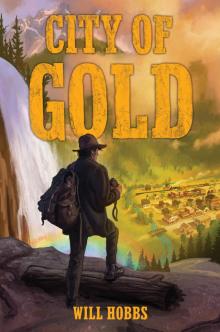 City of Gold
City of Gold Kokopelli's Flute
Kokopelli's Flute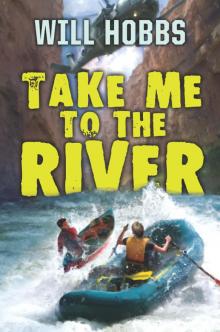 Take Me to the River
Take Me to the River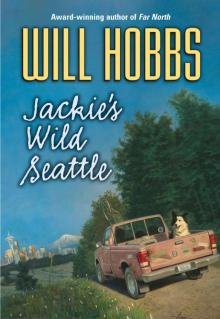 Jackie's Wild Seattle
Jackie's Wild Seattle The Maze
The Maze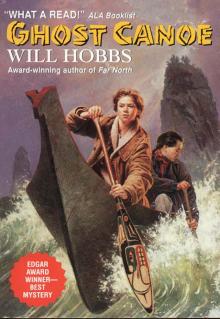 Ghost Canoe
Ghost Canoe Never Say Die
Never Say Die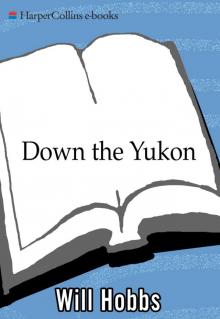 Down the Yukon
Down the Yukon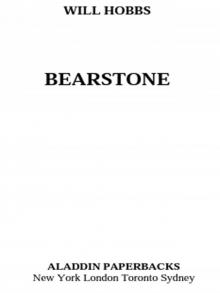 Bearstone
Bearstone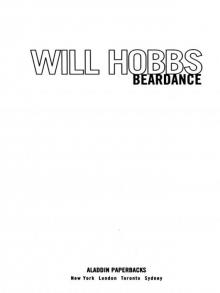 Beardance
Beardance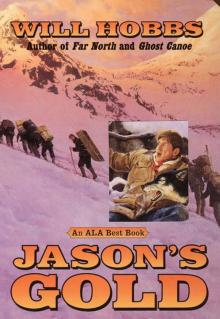 Jason's Gold
Jason's Gold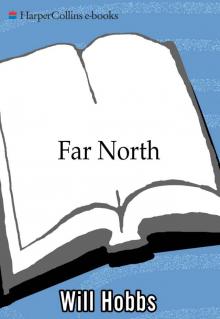 Far North
Far North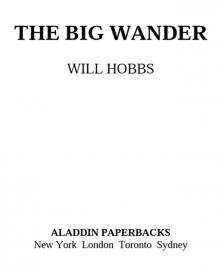 The Big Wander
The Big Wander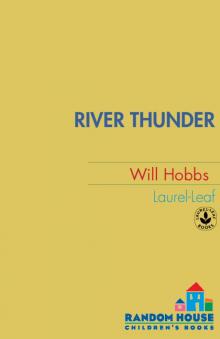 River Thunder
River Thunder Downriver
Downriver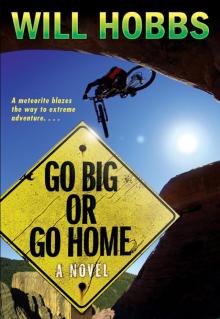 Go Big or Go Home
Go Big or Go Home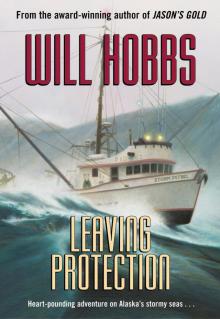 Leaving Protection
Leaving Protection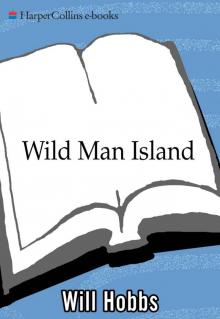 Wild Man Island
Wild Man Island